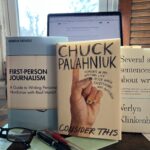Mindfulness and the sound of writing in your head.
What is it they say about meditation and the search for Enlightenment?
“The Master shall appear when you are ready.”
But what if the Master never shows up? Does that mean you still aren’t ready? That you may never be worthy? Maybe the Master knows you’re operating on a different plane. What if you’re an artist, particularly a poet or someone who writes fiction? Perhaps some of us aren’t meant to be ready.
Yogis and cognitive psychologists tell us that the benefits of meditation and mindfulness come from turning off the verbal mind. Writers, of course, tend to have a hard time quieting their thoughts, even when they aren’t sitting with their keyboard and screen or pencil and paper. I’ve wondered for years, then, whether writing is the opposite of Zen and maybe an impediment to my chance at ever attaining Enlightenment.
I’ve tried to be serious about meditation for years, but I’ve never been very good at exploring psychological frontiers if it means turning off my internal dialog engine — not in the heady psychonautical days of the 1970s and not here in the 2020s. Sometimes I‘m capable of several minutes of calm breathing after lunch, but the truth is I don’t feel comfortable (at all) working to shut down the commentator and storyteller in me. Ever…unless it’s my post-lunch siesta maybe.
Clearing Out the Self
Meditation is hard work. If it were simple, everyone would be locking in and calming down daily, and that’s clearly not the case (just turn on cable news). I try. But for me it’s impossible to get nowhere when I’ve trained my mind to swim off into the everywhere of infinite possibility and storytelling.
Peter Matthiessen, author of The Snow Leopard, Far Tortuga, Shadow Country, and numerous other works, was a practicing Buddhist. He wrote and spoke often over the years about the contradictions he encountered between his chosen profession and his zazen meditation work. In a 1993 interview published in the Buddhist magazine Tricycle, Matthiessen says that during meditation training, “…when your mind is emptying day after day, resolutions of plots or characters may rush in to fill the void, especially in the early morning sittings.”
He explained this problem to a master and was told those thoughts were “zazen too.” The master suggested that during rest periods Matthiessen go to his room and write down what he could in order to clear himself out.
That idea of clearing out the self, of course, is a big part of the reason people are supposed to meditate. To be a bit simplistic, it’s how one arrives at nothingness and silence and the pure present.
But what if writing fiction and poetry and creative essays is enough for some of us to clear out our Selves and stay at least partially sane? What, in fact, do we mean when we talk about “mindfulness”? Certainly, for writers, in our best moments anyway, while we write, we lose ourselves, even forget where we are. Our minds are filled with anything except the mundane world we actually live in.
All Kinds of People Everywhere
I used to know someone who refused to eat anything for dinner every night except pan-fried steak, a baked potato slathered in butter, and green peas. I’m serious. Every freaking night for more than forty years! It takes all kinds, right?
I’m not looking here to denigrate the teachings and practices of various Buddhist and Western psychological traditions. But there are so many different types of people in this world, and so many ways to use the mind, so many types of talent and creativity. Perhaps, then, we limit ourselves when we decide that Zen work is only worthy when practitioners seek silence and calm and attempt to conjure nothing and make time virtually evaporate. I get those ideas. I continue to work hard to achieve some form of tranquility through my occasional efforts at focused breathing.
Also, for what it’s worth, there are numerous effective alternatives to sitting zazen, including walking in the woods, listening to certain types of music, massage, a hot bath, the right kind of sex. Personally, I really like taking my twelve-minute siestas after lunch every day.
Questions Without End
So, maybe for those like me it’s not about ever being ready for a Master. Maybe it’s already been determined that some of us need to be left alone because, no matter what, we’re going to do things our own special way regardless of great teachers and brilliant practitioners.
As a writer, I’m rarely looking for solutions to problems so much as wondering why stuff happens at all. Questions are the root of my inspirations. Questions drive so much of what all writers do. I’m not so sure I even need to feel or achieve “enlightenment” in my life, so much as just wake up every morning inspired to be creative somehow, someway, no matter what. That’s why a lot of authors read the paper every day. We’re not looking for answers, we’re waiting for the questions to start up again.
And few questions arrive if the goal is silence. In that way, then, maybe writing truly is the opposite of Zen. But I’m pretty sure you know how that kind of thing goes, right? What seems like an opposite can often be a thing coming around full circle on itself.
I’ll end this with a famous supposedly Zen question:
Question: What is the sound of one hand clapping?
The answer has always been somewhat obvious — at least to me:
Answer: The other hand not clapping.
This essay was originally published in the online publication “Modern Identities” (January, 2022)
Photo by Avrielle Suleiman on Unsplash

